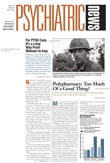The use of a preferred drug list (PDL) to curtail prescription drug costs in the Medicaid program has survived another court battle.
On April 2 the U.S. Court of Appeals for the District of Columbia ruled unanimously that the use of a PDL, which requires prior authorization to prescribe certain drugs, is legal.
According to the April 6 New York Times, the court wrote, “The available data confirm that in practice, the prior-authorization requirement has proved neither burdensome nor overly time consuming.”
The case, PhRMA v. Thompson, began when the Pharmaceutical Research and Manufacturers of America (PhRMA) filed suit on June 28, 2002, against Tommy Thompson, secretary of Health and Human Services, and Thomas Scully, then administrator of the Centers for Medicare and Medicaid Services, because the federal officials had approved Michigan’s request to use a PDL (Psychiatric News, September 20, 2002).
Federal law stipulates that states can exclude drugs from formularies only if they do not have “significant, clinically meaningful, therapeutic advantage in terms of safety, effectiveness, or clinical outcomes.”
PhRMA lawyers alleged that Michigan was violating that law by excluding drugs from the list solely on the basis of price. Pharmaceutical companies must provide states with rebates, which are based on the average wholesale price of the drug, to participate in the Medicaid program.
Michigan state officials, however, had insisted on rebates beyond those required by law for drugs to be on its PDL if the drugs had not been selected as the “most effective” or as “least expensive” in a therapeutic class.
According to PhRMA’s written complaint, Medicaid prescription drug sales total approximately $20 billion a year. Those drugs have become a target for cost cutting because of declining state revenues and accelerating Medicaid costs.
Although the recent ruling is significant as a precedent for other states, Michigan officials had already changed their initial position about prior authorization for psychotropic medications.
Kathleen Gross, executive director of the Michigan Psychiatric Society (MPS), said that in July 2003 state officials exempted all psychotropic medications, with the exception of Effexor, from prior-authorization requirements.
She attributes the change to advocacy from MPS members, particularly the medical directors of the community mental health centers, and from consumer groups.
[PhRMA v. Thompson, D.D.C. No. 02-CV-1306] ▪
